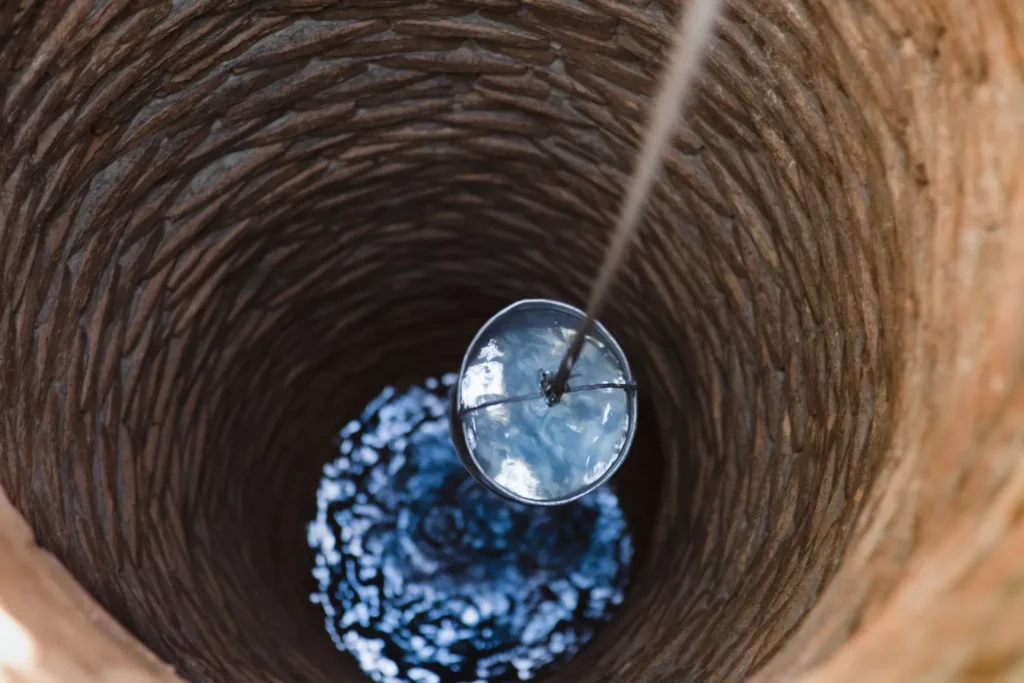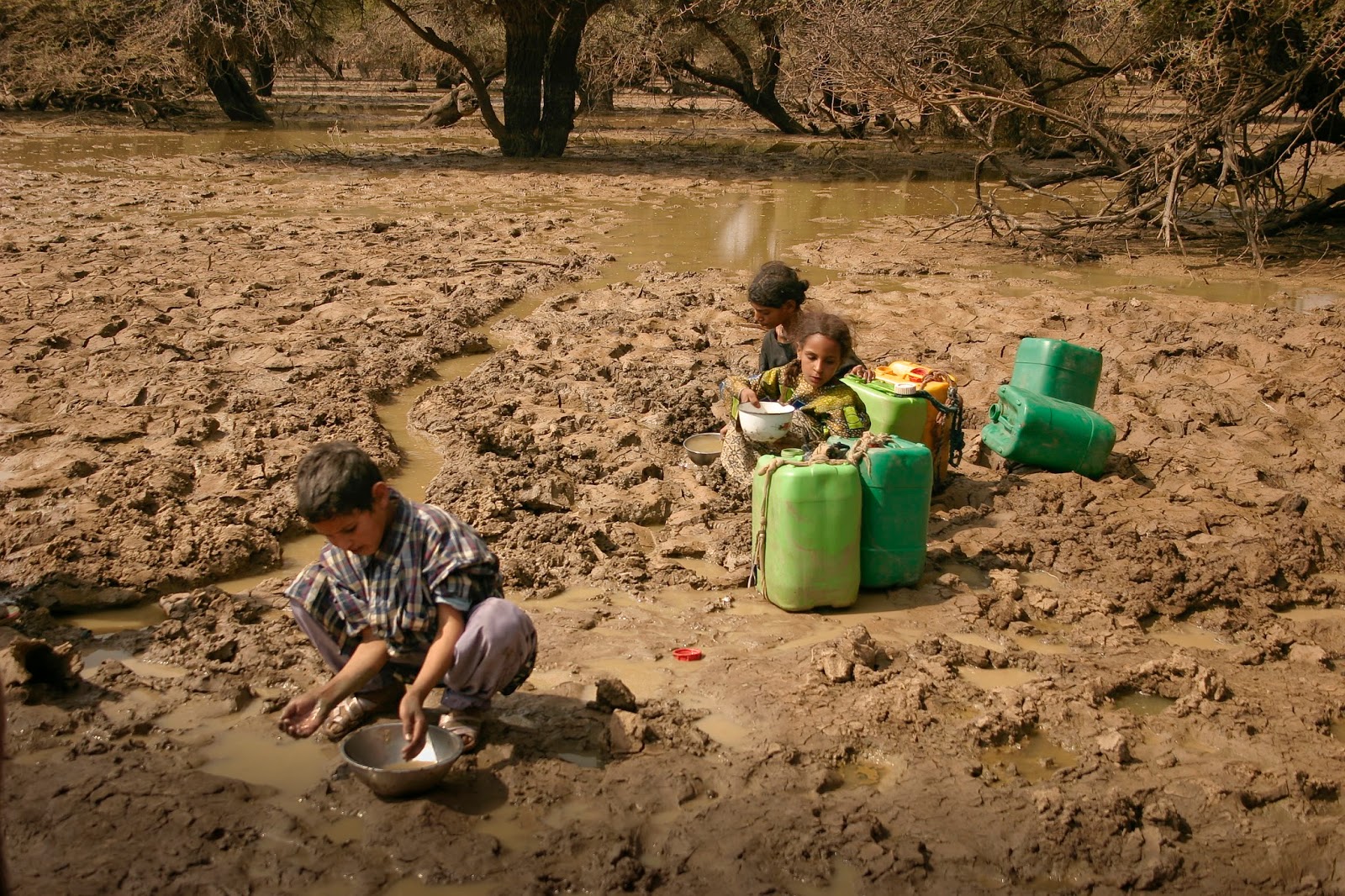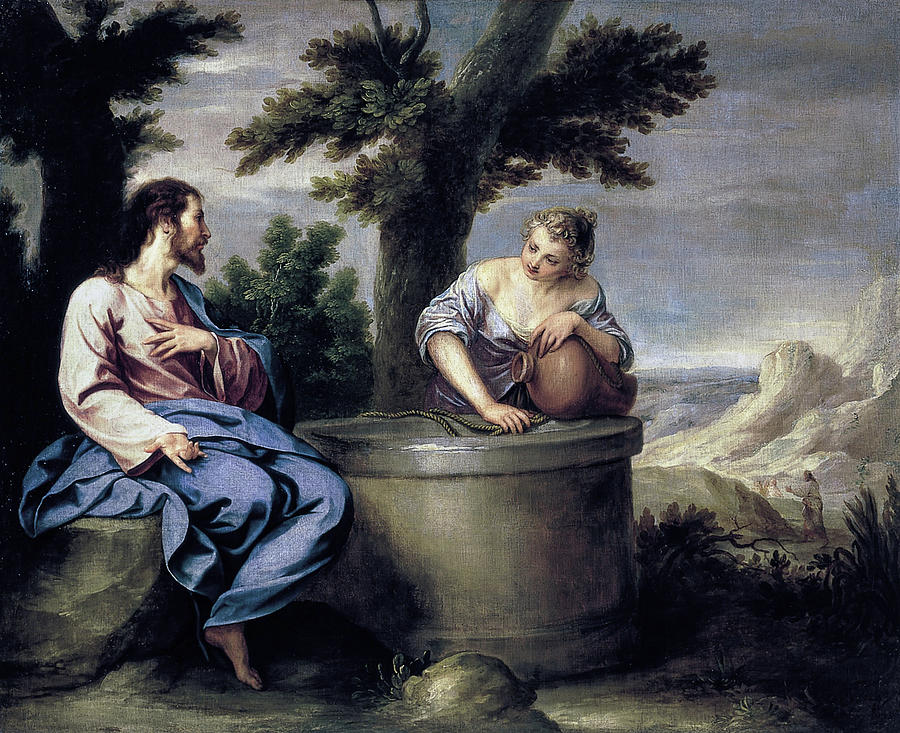Don’t let our wells run dry!
I recently read a National Geographic article about the preciousness of global fresh water resources. The hardships women endure to obtain water shocked me; the task of fetching water defines life for many women in developing countries. Journalist, Tina Rosenberg, followed an Ethiopian woman, Binayo, for a day and watched her spend nearly every hour of every day fetching water.

I quote Ms. Rosenberg:
“Where clean water us scarcest, fetching it is almost always women’s work. In much of the developing world, lack of water is at the center of a vicious circle of inequality. On a hot afternoon I go [with Binayo] to the river, carry an empty jerry can. The trail is steep and in places slippery. We scramble down large rocks alongside cacti and thorn bushes. After 50 minutes we reach the river—or what is a river at certain times of the year. Now it is a series of black, muddy pools, some barely puddles. The banks and rocks are littered with the excrement of donkeys and cows. There are about 40 people at the river, enough so that Binayo decides that the wait might be shorter upstream. The wait is especially long early in the morning, so Binayo usually makes her FIRST trip before it is light. We walk another ten minutes upstream, and Binayo claims a perch next to a good pool, one fed not only by a dirty puddles just above but also a cleaner stream to the side. Children are jumping on the banks, squishing mud through their feet and stirring up the water. ‘Please don’t jump,’ Binayo admonishes them. ‘It makes the water dirtier.’ A donkey steps in to drink from the puddle feeding Binayo’s pool. When the donkey leaves, the women at the puddle scoop out some water to clear it, sending the dirty water down to Binayo, who scolds them. After half an hour it is her turn. She takes her jerry can and her yellow plastic scoop. Just as she puts her scoop in the water, she looks up to see another donkey plunk its hoof into the pool feeding hers. She grimaces. But she cannot wait any longer. She does not have the luxury of time. She makes this trip three or four times a day”
“Our Thirsty World,” April 2010, National Geographic).

Ms. Rosenberg tries to help Binayo by hauling one of the jerry cans (filled with muddy water and weighing 50 pounds) back to camp but can’t manage the weight. An 8-year-old girl carries the water for awhile but tires out. The reporter continues her observations:
Binayo shoots us a look of disgust and continues up the mountain, now with nearly 12 gallons of water—a hundred pounds—on her back. ‘When we are born, we know that we will have a hard life,’ Binayo says. She has never questioned this life, never expected anything different. When you spend hours hauling water long distances, you measure every drop. The average American uses a hundred gallons of water just at home every day; Binayo makes do with two and a half gallons. Persuading people to use their water for washing is far more difficult when that water is carried up a mountain. And yet sanitation and hygiene matter—proper hand washing alone can cut diarrheal diseased by some 45 percent. ‘We don’t even have enough water for drinking—how can we wash our clothes?’ she says. Bringing clean water close to people’s homes is key to reversing the cycle of misery. Communities where clean water becomes accessible and plentiful are transformed. All the hours previously spent hauling water can be used to grow more food, raise more animals, or even start income-producing businesses. Families no longer drink microbe soup, so they spend less time sick or caring for loved ones stricken with waterborne diseases. Most important, freedom from water slavery means girls can go to school and choose a better life. The need to fetch water for the family, or to take care of younger siblings while their mother goes, is the main reason very few women in Konso, Ethiopia have attended school.”
After reading these words, I felt shame and guilt for having been naive as to the preciousness of water and the hardship these women endure. Conversely, I am well acquainted with and greatly appreciate the preciousness of the “living water” of Jesus Christ. I simply cannot survive without this crucial resource. As we know, Christ lived in a land where water was scarce. Biblical women were required to fetch water at the wells. At Jacob’s well, Christ talked to a Samaritan woman and said, “If thou knewest the gift of God, and who it is that saith to thee, ‘Give me to drink,” thou wouldest have asked of him, and he would have given thee living water. Whosoever drinketh of the water that I shall give him shall never thirst, but the water that I shall give him shall be in him a well of water springing up into everlasting life” (John 4:13-14). I admire the Samaritan woman for recognizing Christ as the Messiah while so many others could not and rejected Him.

Elder Bruce R. McConkie defined living water as follows:
- The words of eternal life.
- The message of salvation (meaning Christ’s Atonement).
- The truths about God and His kingdom.
- The doctrines of the gospel.
- The prophets of God: Where there are prophets of God, there will be found rivers of living water, wells filled with eternal truths, springs bubbling forth their life-giving draughts that save from spiritual death (Doctrinal New Testament Commentary, 1965, p.151-2).
To physically drink water requires a series of specific acts: First, we must find water, then find and use a utensil or cup to use for drinking (using our hands is ineffective) and/or position our body to drink. Next, we fill the utensil with water, bring it to our lips, and then swallow. And we must do this consistently every single day, several times a day, or we become dehydrated and soon die. Likewise, to drink the living water, we must also consciously and consistently choose to seek and receive the water. In doing so, we eventually become a well of living, nurturing water for others. I’ve learned that there is a direct correlation between the depth of our individual wells and the strength of our water current as it springs forth and flows within us. To dig and deepen our wells while increasing our water flow requires the following:
- A willing heart to search for oases of living water.
- A committed heart to spending and sacrificing the required time and energy to fetch the living water.
- A humble heart: If we think fetching water is beneath us or mundane, we will thirst and eventually suffer a spiritual death. trustful heart: It takes guts to follow God, as He leads us through hot deserts to oases of living water.
- A heart of faith: Even Christ questioned whether to drink from “the bitter cup.”
- A heart of love for Christ and for His children.
- A courageous heart: Others will often criticize and mock us as we drink the living water.
- A trustful heart: It takes guts to follow God, as He leads us through hot deserts to oases of living water.
Conversely, here’s what stifles our springs of water and poisons our wells:
- A prideful heart
- An arrogant heart
- An angry heart
- An unforgiving or bitter heart
- An apathetic heart
- A lazy heart
- A fearful heart
- A pitiful heart
So, what’s flowing out of us? Water? Poison? Nothing? Minister Joyce Meyer discusses this notion in her sermon called “Removing Hindrances”:
What’s flowing out of us is more important than what’s going on around us. We pay way too much attention to what’s going on around us than what’s going on within us. God wants us to live with a flow in our lives where we’re not constantly being opposed and oppressed. God wants you to overflow with His goodness, His peace, His joy, and all that He is. Do we fill all stopped up, blocked, or hindered….rather than feeling pure water bubbling up out of us? If we could just get the good stuff in us out of us—the peace, the joy, the hope, and the power, we could be world changers. The Israelites had to fight a lot of enemies. Water was a great blessing, so their enemies would come up and fill up their wells with dirt and rocks, so the Israelites couldn’t access their water. Some of the stones that hinder us: stones of complaint, stones of injustice, stones of worry, stones of anxiety, stones of fear, stones of offense, stones of selfishness, stones of the past, stones of doubt and unbelief. There’s so many things the devil tries to aggravate us with. We have to work hard to take the hindrances out of ourselves, and unblock the flow of God’s power in us. When we carry these stones around and have all this junk in our lives, we can’t feel the flow (Joyce Meyer Ministries DVD).
Listening to the Tabernacle Choir last Sunday, I was very moved by their performance of an old African-American slave spiritual called, “Peace Like the River.” The beautiful lyrics echo my feelings as I continue to deepen my well and purify my water through Christ’s Atonement:
I’ve got peace like a river in my soul. I’ve got faith like a river in my soul. I’ve got hope like a river in my soul. I’ve got love like a river in my soul.
Below is the link to the entire song:

Peace Like a River (2012) | The Tabernacle Choir
www.youtube.comPurchase “Peace Like a River” from the album “Peace Like a River”: Amazon: http://amzn.to/S8vY7qiTunes: http://bit.ly/RrXQ7wDeseret Book: http://bit.ly/V00Co…
I’ll close this post with one last thought. As our water flows within us, we have to be willing to share it regardless of personal inconvenience, fear of judgment, discomfort, or whatever. I’ll never forget an experience I had a few years ago while on a Southwest Airlines flight from California to Utah. Southwest doesn’t assign seats, and I was one of the last people to board the plane. I’m not one who enjoys chit-chatting with fellow passengers; I like to use that time to read. And, I prefer sitting in an aisle seat but absolutely dread sitting in the middle seat. Boarding the plane with my O Magazine in hand, I was stuck with the middle seat between two men—one of whom reeked of alcohol. After securing my seat belt, I stuck my nose in my magazine hoping to discourage any conversation. The man seated to my right (the one who reeked and was partially drunk) would have none of it. My terse one word answers to his queries only emboldened him. Asking about my career, I told him I taught classes in communication. Asking about my religion, I told him I was a Latter-day Saint. That’s when I sensed the distress in his voice and in his countenance. Obeying the promptings of the Spirit, I closed my magazine, mustered up my compassion, and tried to answer this man’s distress call.
He talked of his staunch Latter-day Saint family’s rejection of him because of his church inactivity and failure to “obey the Word of Wisdom.” His older brother was the “good son who served a mission.” He defined himself as the “loser” and “black sheep” of the family. His wife had divorced him because of his alcoholism. He called himself a bad father. As my heart ached for him, I felt the Spirit say to me, “Tell this man that God deeply loves him.” I repeated these words to him while reassuring him of his worth. As i spoke to him, he drank up my words as fast as the alcohol on his plane table. I used my professional training in interpersonal communication and family dynamics to assure him that he was not inherently defective or “bad.” Rather, his family system sounded broken and rooted in fear, divisiveness, polarization, and shame. And that was not his fault. We are not responsible for what happened to us as children, but as adults, we are responsible to heal. I also shared my own past struggles with feelings of insecurity and fear; and how the living waters of Christ’s Atonement soothed and healed me. As we prepared for landing, I said, “It was no accident I ended up seated next to you on this flight. I know that God wanted me to tell you all of these things, and that He is very aware of you.” I was surprised when the other man to my left (who hadn’t said a word during the entire flight) said, “I think you were supposed to sit by me too. You’ve said a lot of things I needed to hear.”
Isn’t God grand? Are not His ways unexpectedly wonderful? I learned that day about digging wells and flowing water. I could drill all the way down to the South Pole and my water flow like Niagara Falls, but if I’m not willing to share my water with others, then God will allow my well to dry up.
Let the water flow,
Julie

